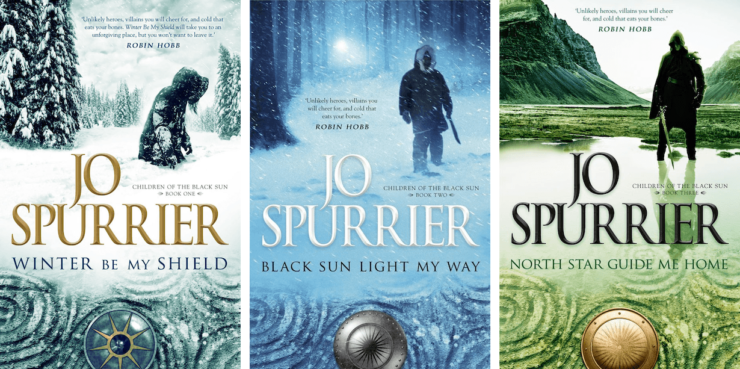Last time out, I believe I mentioned Jo Spurrier’s Winter Be My Shield, and mentioned that I’d be reading the next two books in the “Children of the Black Sun” trilogy as soon as I could get my hands on them. Those books are Black Sun Light My Way and North Star Guide Me Home, and they are just as good, if not better, than their predecessor.
It would be easier for some of the things this trilogy deals with to feel gratuitous, exploitative: it’s interested in how trauma (torture, slavery, long-term abuse, complicity in that kind of unpleasantness) affects and changes people; in people recognising that shit’s fucked up but being stuck dealing with it regardless; in relations of power; in empathy; and in how people recover from extreme experiences—and make restitution for some fairly serious wrongs. But Spurrier treads a careful line between making some pretty awful stuff apparent to the reader and focusing on it to the point where it feels like prurient dwelling on awful things. (It doesn’t come across as exploitative prurience.) The narrative is grounded in empathy for the characters, even when Spurrier is investigating the consequences of putting them between very pointy rocks and extremely hard places. And Spurrier’s characters are compelling individuals. It’s easy to sympathise with them, to find them appealling—even the torturer’s apprentice and blood mage Rasten, who’s done unforgivable things but who has never really been able to make a free choice.
The trilogy is an epic narrative of war and restoration, but it is intimately focused on the survivors of trauma. It’s more interested in recovery than in suffering: in growth, and in the formation or reformation of new, mutually supportive, sustaining familial relationships. One of the more interesting pieces of Spurrier’s worldbuilding is that among the Ricalani, marriages are between a minimum of four people (because the demands of the climate mean that it makes sense to have plenty of adults to a household), and this makes the negotiation of family formation a bit complicated, especially when people have a lot of feelings about their partners’ other partners. Polyamory at its most complicated—and possibly most awkward.
One of the things that has stayed with me about the trilogy (one of the things that makes me want to read it again) is that Spurrier is interested not so much in what people do and who people are when they’re driven to extremity—who you are when you’re alone in the dark with only a choice of evils confronting you—but in what they do given space to grow and room to make choices that aren’t forced by circumstance. That’s what the characters are striving for throughout the trilogy, and that? That’s a narrative arc I can really get behind.
Speaking of narrative arcs I can get behind: A Curse of Ash and Embers. Also by Jo Spurrier. (I’m on a real kick. FOLLOW THAT BACKLIST!) This is a YA novel about a young woman, Elodie, hired out as a servant at Black Oak Cottage, several days away from home. What Elodie doesn’t know until she gets there, however, is that Black Oak Cottage is a witch’s residence. Gyssha Blackbone used to terrorise the whole area. But she’s dead now. Just about. Mostly. The new mistress of Black Oak Cottage is a sharp-tongued, sarcastic, exhausted woman called Aleida. Gyssha’s final curse has left Aleida in a pretty shitty state. The last thing she was expecting was for a housemaid to turn up on her doorstep—and then refuse to leave.
Elodie’s not going home. But there are monsters in the woods, a demonic tree in the orchard, an angry warlock lurking around, and not only is there no food in the pantry, but the locals are absolutely terrified of the witch. Aleida needs her help. And Elodie’s stubborn enough to give it to her.
There’s something reminiscent of Terry Pratchett’s Lancre witches about A Curse of Ash and Embers, with a touch of T. Kingfisher/Ursula Vernon’s determinedly practical protagonists caught up in magical shenanigans. (Gyssha Blackbone seems a lot like Granny Weatherwax might have been, if she’d gone to the bad—really really good at being really really bad.) And Spurrier has a deft touch with characterisation and development, as well as a great talent for stories about survival, recovery, and found family—though A Curse of Ash and Embers is quite a bit gentler than Spurrier’s earlier trilogy. I confess, I adore it: it’s exactly to my tastes.
What are you all reading lately?
Liz Bourke is a cranky queer person who reads books. She holds a Ph.D in Classics from Trinity College, Dublin. Her first book, Sleeping With Monsters, a collection of reviews and criticism, was published in 2017 by Aqueduct Press. It was a finalist for the 2018 Locus Awards and was nominated for a 2018 Hugo Award in Best Related Work. She was a finalist for the inaugural 2020 Ignyte Critic Award, and has also been a finalist for the BSFA nonfiction award. Find her on Twitter. She supports the work of the Irish Refugee Council, the Transgender Equality Network Ireland, and the Abortion Rights Campaign.










